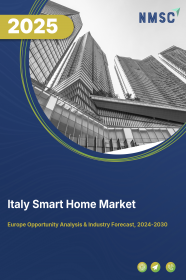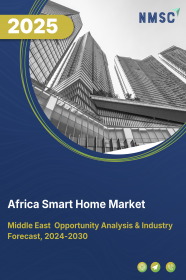
Italy Smart Home Market by Product Type (Smart Lighting, Smart Home Security & Surveillance, Smart Entertainment, and Smart Appliances), by Communication Protocol (Wi-Fi, Zigbee, Z-Wave, Bluetooth, and Thread), by Smart Home Hubs (Standalone Hubs and Built-in Hubs), by Voice Assistants Integration (Amazon Alexa, Google Assistant, Apple Siri, and Others) – Opportunity Analysis and Industry Forecast, 2024–2030
Industry: Retail and Consumer | Publish Date: 15-Feb-2025 | No of Pages: 140 | No. of Tables: 104 | No. of Figures: 69 | Format: PDF | Report Code : RC2273
Italy Smart Home Market Overview
The Italy Smart Home Market size was valued at USD 3.39 billion in 2023, and is predicted to reach USD 12.58 billion by 2030, at a CAGR of 20.6% from 2024 to 2030. A smart home, also known as a connected home, depicts a living space equipped with cutting-edge technology and automated systems that enable the oversight and monitoring of numerous household devices, appliances, and security features through a centralized network. These intelligent gadgets are managed remotely and often respond to voice commands or present schedules, enhancing convenience, energy efficiency, and security for inhabitants. Typical features found in smart homes include smart thermostats, lighting systems, security cameras, voice assistants, and other interconnected devices tailored to improve the overall standard of living.
Technological Advancement by Regional Players Drives the Italy Smart Home Market Growth
In Italy, the smart home market is significantly influenced by the technological advancements made by regional market players. Renowned for its prowess in the robot and automation industry, Italy boasts numerous innovative companies leading the charge. These regional players spearhead the development of sophisticated connected home solutions, encompassing smart thermostats, security cameras, voice-controlled assistants, energy-efficient lighting systems, and automated home appliances.
Consumer Awareness and Technological Advancements Boosts the Growth of the Italy Smart Home Market Trends
The connected home market in Italy is experiencing a surge propelled by two primary factors. Firstly, consumers are becoming increasingly cognizant of the benefits associated with connected home solutions, including heightened convenience, energy efficiency, and enhanced security. Secondly, ongoing technological advancements led to the creation of more sophisticated and user-friendly connected home devices and systems, rendering them accessible and appealing to a broader audience. These factors drive the rapid growth of the Smart Home industry in Italy.
According to the Internet of Things Observatory of the School of Management at Politecnico Milano, the connected home sector in Italy exhibited significant growth in 2022, expanding by 18% compared to the previous year and reaching a total market value of 770 million euros. This growth rate outpaced that of many other European countries.
Security and Data Privacy Acts as Restraining Factors of the Market Growth
The expansion of the connected home market encounters a significant impediment due to concerns surrounding security and data privacy linked with interconnected systems. Devices such as thermostats, cameras, and door locks are susceptible to hacking, posing risks to the privacy and safety of residents. Weak or easily guessable passwords and inadequate Wi-Fi network security measures often underlie this vulnerability.
Exploiting these weaknesses, hackers gain unauthorized access, potentially taking control of devices or accessing sensitive data. To mitigate these risks, homeowners must adopt robust password practices, regularly update device firmware, and bolster their home networks to counter the threat of cyber-attacks and safeguard their smart homes from potential breaches.
Integration of Blockchain Technology into Smart Home Devices Presents Lucrative Opportunity for Market Expansion
The integration of blockchain technology into smart home devices offers significant potential to enhance the security and privacy of connected home systems. Recognized for its robust security and transparency features, blockchain encrypts and securely stores sensitive connected home data, empowering users to control access to their information and minimizing the risk of unauthorized entry. Blockchain validates device identities, ensuring that only trusted devices interact within the connected home network, and automates tasks through tamper-proof smart contracts.
Additionally, it decentralizes device control, reducing vulnerabilities and enabling transparent access control and permissions management. By integrating blockchain into smart homes, security and privacy are heightened, fostering a safer and more confidential connected home environment. Consequently, this integration is poised to generate ample growth opportunities for the market.
Competitive Landscape
Several market players operating in the Italy smart home industry include Honeywell International, Inc., Schneider Electric, ABB Ltd, Amazon, Loxone Electronics GmbH, Samsung, LG Electronics, Shelly, eQ-3, Google Home.
Italy Smart Home Market Key Segments
By Product Type
-
Smart Lighting
-
Smart Bulbs
-
Smart Light Strips
-
Smart Switches
-
-
Smart Home Security and Surveillance
-
Smart Cameras
-
Video Doorbells
-
Smart Locks
-
Security System
-
-
Smart Entertainment
-
Smart TVs
-
Smart Speakers
-
Streaming Devices
-
-
Smart Appliances
-
Smart Refrigerators
-
Smart Ovens
-
Smart Washing Machines
-
Smart Dishwashers
-
Smart Home HVAC Management
-
Other Smart Appliances
-
By Communication Protocol
-
Wi-Fi
-
Zigbee
-
Z-wave
-
Bluetooth
-
Thread
By Smart Home Hubs
-
Standalone Hubs
-
Built-in Hubs
By Voice Assistants Integration
-
Amazon Alexa
-
Google Assistant
-
Apple Siri
-
Others
By Smart Home Compatibility with Smartphones
-
iOS
-
Android
By Installation
-
DIY Installation
-
Professional Installation
By Sales Channel
-
Online Retailers
-
Retailers
REPORT SCOPE AND SEGMENTATION:
|
Parameters |
Details |
|
Market Size in 2023 |
USD 3.39 Billion |
|
Revenue Forecast in 2030 |
USD 12.58 Billion |
|
Growth Rate |
CAGR of 20.6% from 2024 to 2030 |
|
Analysis Period |
2023–2030 |
|
Base Year Considered |
2023 |
|
Forecast Period |
2024–2030 |
|
Market Size Estimation |
Billion (USD) |
|
Growth Factors |
|
|
Companies Profiled |
10 |
|
Market Share |
Available for 10 companies |
|
Customization Scope |
Free customization (equivalent up to 80 working hours of analysts) after purchase. Addition or alteration to country, regional, and segment scope. |
|
Pricing and Purchase Options |
Avail customized purchase options to meet your exact research needs. |
KEY PLAYERS
-
Honeywell International, Inc.
-
Schneider Electric
-
ABB Ltd
-
Amazon
-
Loxone Electronics GmbH
-
Samsung
-
LG Electronics
-
Shelly
-
eQ-3
-
Google Home

















 Speak to Our Analyst
Speak to Our Analyst




















